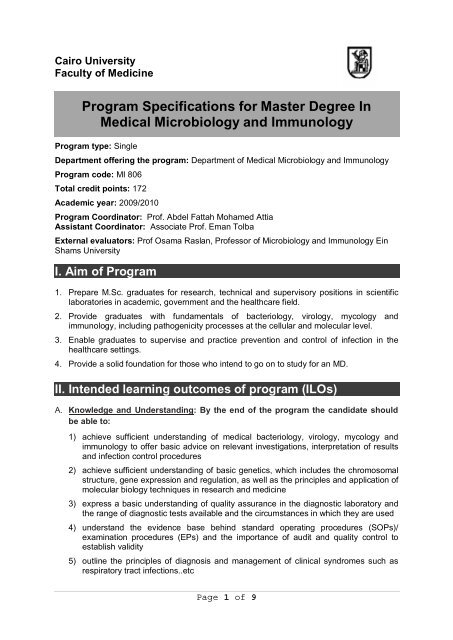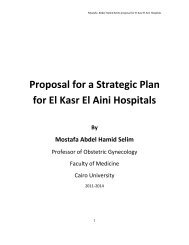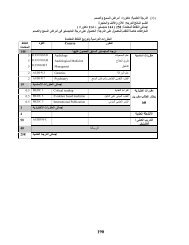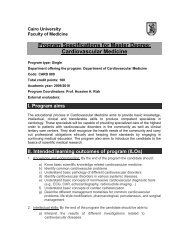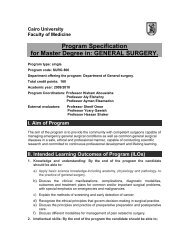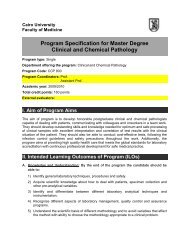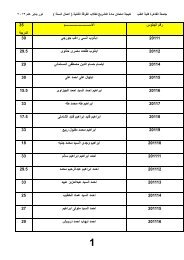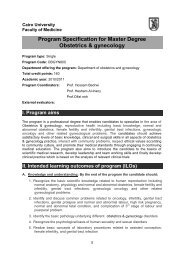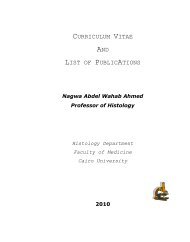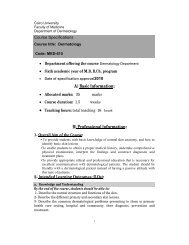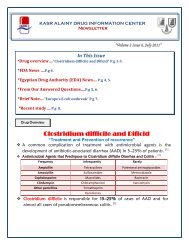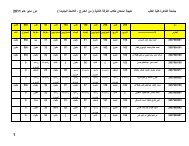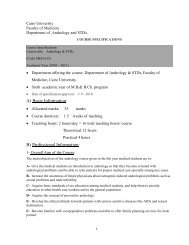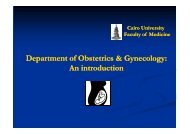IM 800
IM 800
IM 800
Create successful ePaper yourself
Turn your PDF publications into a flip-book with our unique Google optimized e-Paper software.
Cairo University<br />
Faculty of Medicine<br />
Program Specifications for Master Degree In<br />
Medical Microbiology and Immunology<br />
Program type: Single<br />
Department offering the program: Department of Medical Microbiology and Immunology<br />
Program code: MI 806<br />
Total credit points: 172<br />
Academic year: 2009/2010<br />
Program Coordinator: Prof. Abdel Fattah Mohamed Attia<br />
Assistant Coordinator: Associate Prof. Eman Tolba<br />
External evaluators: Prof Osama Raslan, Professor of Microbiology and Immunology Ein<br />
Shams University<br />
I. Aim of Program<br />
1. Prepare M.Sc. graduates for research, technical and supervisory positions in scientific<br />
laboratories in academic, government and the healthcare field.<br />
2. Provide graduates with fundamentals of bacteriology, virology, mycology and<br />
immunology, including pathogenicity processes at the cellular and molecular level.<br />
3. Enable graduates to supervise and practice prevention and control of infection in the<br />
healthcare settings.<br />
4. Provide a solid foundation for those who intend to go on to study for an MD.<br />
II. Intended learning outcomes of program (ILOs)<br />
A. Knowledge and Understanding: By the end of the program the candidate should<br />
be able to:<br />
1) achieve sufficient understanding of medical bacteriology, virology, mycology and<br />
immunology to offer basic advice on relevant investigations, interpretation of results<br />
and infection control procedures<br />
2) achieve sufficient understanding of basic genetics, which includes the chromosomal<br />
structure, gene expression and regulation, as well as the principles and application of<br />
molecular biology techniques in research and medicine<br />
3) express a basic understanding of quality assurance in the diagnostic laboratory and<br />
the range of diagnostic tests available and the circumstances in which they are used<br />
4) understand the evidence base behind standard operating procedures (SOPs)/<br />
examination procedures (EPs) and the importance of audit and quality control to<br />
establish validity<br />
5) outline the principles of diagnosis and management of clinical syndromes such as<br />
respiratory tract infections..etc<br />
Page 1 of 9
6) describe the important mechanisms of microbial pathogenesis and outcomes of<br />
infections with emphasis on molecular immunology and immunity to infections<br />
7) achieve sufficient understanding of the important microbial infections with an<br />
emphasis on the common infections in practice, including endemic infections and<br />
infections associated with severely immunocompromised patients<br />
8) explain the modes of transmission of pathogenic microorganisms (chain of infection)<br />
and how the pathogen is maintained in nature<br />
9) describe how the pathogen could be eliminated; in the environment, from medical<br />
equipment and devices and in order to provide safe healthcare<br />
10) express the ability to utilize evidence-based guidelines for prevention and control of<br />
infection/disease<br />
11) clarify treatment of infection caused by the pathogen<br />
12) list the key considerations and principles in the planning and design of a study on the<br />
basis of statistical methods<br />
13) achieve advanced understanding of qualitative and quantitative research methods<br />
and how to conduct original research, including relevant legal and ethical issues<br />
B. Intellectual Skills: By the end of the program the candidate should be able to:<br />
1) analyze clinical and laboratory problems effectively, and correctly interpret and<br />
explain results simply and effectively to clinicians and patients<br />
2) demonstrate basic criteria used in the taxonomy of bacteria, viruses and fungi<br />
3) plan an appropriate investigation scheme for individuals at risk of infection<br />
4) demonstrate important mechanisms of microbial pathogenesis, basic concepts of<br />
molecular immunology, immunity to infection and outcomes of infections<br />
5) utilize guidelines for prevention and control of infection/disease<br />
6) compare and contrast the common symptoms of infectious diseases<br />
7) produce accurate letters/reports with clear conclusions<br />
8) analyze the applications of DNA preparations, such as DNA extraction, cloning,<br />
transformation and PCR<br />
9) plan an independent research proposal to a high professional and ethical standard<br />
10) plan, undertake and report an independent research project<br />
11) write well-structured and clear essays<br />
C. Professional and Practical Skills: By the end of the program the candidate should<br />
be able to:<br />
1) perform diagnostic laboratory tests in medical bacteriology, virology, mycology and<br />
immunology to offer basic advice on relevant investigations, interpretation of results<br />
and infection control procedures<br />
2) plan and execute laboratory experiments with an awareness of good laboratory<br />
practice assessment<br />
3) prepare standard operating procedures<br />
4) prepare laboratory reports<br />
Page 2 of 9
5) analyze and interpret laboratory data relevant to the cases of medical microbiology<br />
and immunology<br />
6) perform the isolation and characterization of specific microbes in clinical specimens<br />
7) Identify the pathogen by its specific growth characteristics if any, distinguishing<br />
biochemical tests, its morphological and/or staining characteristics, immunological<br />
or nucleic acid-based tests<br />
8) perform basic laboratory techniques in extraction and analysis of genomic DNA<br />
including protein and PCR technology<br />
9) demonstrate bioinformatics software applications<br />
10) identify the manual diagnostic procedures and the application of laboratory<br />
automation for diagnosis, quality control program and laboratory administration<br />
11) adhere to relevant precautions and safety procedures in a medical microbiology lab<br />
12) use computational tools and packages<br />
13) develop an understanding of the biological characteristics of pathogenic<br />
microorganisms, the course of their infections, the functions of the immune system<br />
and the actions of antibiotics against these pathogens<br />
14) produce a research proposal to a professional standard, and submit an application to<br />
the ethics committee<br />
15) apply knowledge of sampling variation to construct 95% confidence intervals and test<br />
hypotheses about population means and proportions<br />
16) choose and perform the appropriate statistical technique for the analysis of means<br />
and proportions giving the research question and distribution of the data<br />
17) interpret the results of simple statistical analysis and communicate them in a clear,<br />
concise and appropriate manner<br />
D. General and Transferable Skills: By the end of the program the candidate should<br />
be able to:<br />
1) communicate effectively through oral presentations, computer processing and<br />
presentations, and written reports<br />
2) integrate and evaluate information from a variety of sources<br />
3) transfer techniques and solutions from one discipline to another<br />
4) manage resources and time<br />
5) learn independently and effectively with critical inquiry for the purpose of continuing<br />
professional development.<br />
6) Understand different scientific methodologies and have critical reading abilities<br />
7) Write scientific article according to the basics of scientific research.<br />
Page 3 of 9
III. Academic standards<br />
External References for Standards:<br />
a- Department of Microbiology and Immunology, New York Medical College,<br />
Valhalla, NY 10595, Telephone: 914 594-4175, Fax: 914 594-4176<br />
b- London School of Hygiene & Tropical Medicine, University of London,<br />
http://www.lshtm.ac.uk/courses/<br />
c- UNIV OF WISCONSIN MADISON, Medical School.<br />
IV. Program Admission Requirements<br />
According to the bylaws of the Faculty of Medicine - Cairo University for Post Graduate<br />
Programs (July 2009), applicants should have MBBch or equivalent degree. According to<br />
Cairo University requirements, all applicants for postgraduate studies should fulfill<br />
preliminary courses on the following subjects; Medical statistics I – English language<br />
(TOEFL or equivalent degree) – Computer skills (ICDL). Admission to the program is open<br />
during July. Selection criteria will be established by the Council of the Medical Microbiology<br />
and Immunology Department including the minimum score of the Bachelor Degree.<br />
V. Program Structure and Contents<br />
Program duration: Three academic years.<br />
Program structure: Total Credit points 172<br />
· First part: 1.5 years - Total credit points 52 - (Table 1)<br />
o Compulsory courses; one academic year (30 weeks)<br />
• Medical Biochemistry 8 credit points<br />
• Medical Biostatistics 1 credit point<br />
o Elective courses<br />
1 credit points<br />
o Scientific activities<br />
2 credit points<br />
o Practical training program Part 1<br />
40 credit points<br />
“Basic training” for 18 months<br />
(10 months Medical Biochemistry + 2 months Medical Parasitology + 6 months Med<br />
Microbiology and Immunology)<br />
· Second part: 1.5 years - Total credit points 120 - (Table 2)<br />
o Compulsory courses; one academic year (30 weeks)<br />
• Medical Microbiology and Immunology 16 credit points<br />
o Scientific activities<br />
4 credit points<br />
o Practical training program Part 2<br />
60 credit points<br />
· Master Thesis: completed during second part 40 credit points.<br />
Page 4 of 9
Table 1: First part<br />
Courses<br />
Credit Points<br />
Code Title CPs Total<br />
ILOs<br />
COMPULSORY COURSES<br />
MI 804 Medical Biochemistry<br />
– Basic Biochemistry and metabolism<br />
8 9 A 1 , A 2 , A 3 , A 4 ,<br />
A 6 , B 4 , B 8 , D 2 , D 3<br />
– Basic genetics and Molecular Biology<br />
MI 809 MB Medical Biostatistics 1<br />
A 12 , C 15 , C 16 , C 17<br />
ELECTIVE COURSES (MEDC) choose ONE course<br />
MI 805 Medical Parasitology 1 1 A 5 , A 8 , A 9 , A 11 ,<br />
B 3 , B 6<br />
MI 809 IOD Infectious and Occupational Diseases 1<br />
SCIENTIFIC ACTIVITIES<br />
1 st Part Scientific activities 2 2 D 6 , D 7<br />
PRACTICAL TRAINING PROGRAM (Basic training)<br />
MI 806 P1 Practical training program part 1 40 40 C 2 , C 5 , C 8 , C 9 ,<br />
C 10 , C 13<br />
A 7<br />
Table 2: Second part<br />
Courses<br />
Credit Points<br />
Code Title CPs Total<br />
ILOs<br />
COMPULSORY COURSES<br />
MI 806 Medical Microbiology and Immunology 16 16 A 1 –A 11 , B 1 –B 8 ,<br />
D 1 –D 5<br />
SCIENTIFIC ACTIVITIES<br />
2nd Part Scientific activities 4 4 D 6 , D 7<br />
PRACTICAL TRAINING PROGRAM<br />
MI 806 P2 Practical training program Part 2 60 60 A 3 –A 5 , A 9<br />
C 1 –C 13<br />
MASTER THESIS<br />
Master Thesis 40 40 A 12 , A 13 ,<br />
B 7 –B 11 ,<br />
C 14 , D 6 , D 7<br />
Practical Training Program<br />
According the Faculty of Medicine, Cairo University Bylaws for Post Graduate Programs<br />
(July 2009), all the students should have a basic training for 18 months. They should spend<br />
10 months in Biochemistry Department, 2 months in Parasitology Department and 6 months<br />
in the department of Microbiology and Immunology. The whole of the second part of the<br />
practical training program will be conducted in the department of Microbiology and<br />
Immunology. The details of the training program are found in a separate document.<br />
Page 5 of 9
MEDICAL MICROBIOLOGY AND <strong>IM</strong>MUNOLOGY MASTER DEGREE PROGRAM MATRIX<br />
A<br />
B<br />
Courses<br />
Knowledge and Understanding<br />
Intellectual Skills<br />
Code Name 1 2 3 4 5 6 7 8 9 10 11 12 13 1 2 3 4 5 6 7 8 9 10 11<br />
MI 804 Medical Biochemistry x x x x x x x<br />
MI 809 MB Medical Biostatistics x<br />
MI 806 Medical Microbio./Immun. x x x x x x x x x x x x x<br />
MI 805 Medical Parasitology x x x x x x<br />
MI 809 IOD Infectious/Occupational Dis. x<br />
1 st Part Scientific Activities part 1<br />
2 nd Part Scientific Activities part 2<br />
MI 806 P1 Practical training program part 1<br />
MI 806 P2 Practical training program part 2 x x x x<br />
Master x x x x x x x<br />
C<br />
D<br />
Courses<br />
Professional Skills<br />
General/Transferable<br />
Code Name 1 2 3 4 5 6 7 8 9 10 11 12 13 14 15 16 17 1 2 3 4 5 6 7<br />
MI 804 Medical Biochemistry x x<br />
MI 809 MB Medical Biostatistics x x x<br />
MI 806 Medical Microbio./Immun. x x x x x<br />
MI 805 Medical Parasitology<br />
MI 809 IOD Infectious/Occupational Dis.<br />
1 st Part Scientific Activities part 1 x x<br />
2 nd Part Scientific Activities part 2 x x<br />
MI 806 P1 Practical training program part 1 x x x x x x<br />
MI 806 P2 Practical training program part 2 x x x x x x x x x x x x x<br />
Master x x x<br />
Page 6 of 9
Master Thesis<br />
All master-degree students should prepare thesis in Medical Microbiology and Immunology.<br />
The department and the ethical committees must approve the protocol of the research. The<br />
thesis (should / may) include a review part and a research part. The thesis is supervised by<br />
one or more senior staff members and may include other specialties according to the nature<br />
of the research. The thesis should be evaluated and approved by a committee of three<br />
professors including one of the supervisors and an external professor.<br />
Scientific Activities:<br />
The students should participate in the scientific activities of the departments such as:<br />
· Journal club (presenting scientific articles) once every 2 weeks.<br />
· Seminars (including recent topics and controversial issues). Students are expected to<br />
participate in the discussions.<br />
· Scientific meetings arranged by the department.<br />
· Others e.g., conferences,etc<br />
Each activity is monitored and given credit points registered in the candidate logbook. The<br />
student should collect the required points before allowed to sit for final exam.<br />
VI. Regulations for Progression and Program Completion<br />
After finishing the first part, attending the specified courses and collecting the required credit<br />
points, the student should pass the first part examination before proceeding to the second<br />
part. In case the student fails to pass the examination, he may proceed in the practical<br />
training and can resubmit for the next first part examination. After passing the first part, the<br />
student submits a protocol for master thesis at the beginning of second part. Before<br />
submitting to the final exam, he should finish the thesis and get approval, complete phase 2<br />
of practical training program, and collect the required credit points. The candidate will<br />
receive his degree after passing this final examination. Master degree should be obtained<br />
within a maximum of 6 years after registration date.<br />
VII. Assessment<br />
A: Assessment Tools<br />
· Supervision and Monitoring of Training Program<br />
According the Faculty of Medicine, Cairo University Bylaws for Residency Training<br />
Programs, coordinators carry continuous assessment during the program. A residency<br />
training logbook including scientific activities will be kept for each student to document all<br />
his/her clinical, laboratory and/or operative activities as well as his/her participation in<br />
different scientific activities. The head of the department should allow the students to<br />
undergo the final examination when they complete their training program and collect the<br />
credit points needed.<br />
· Formal Assessment<br />
According to the Faculty of Medicine, Cairo University Bylaws for Post Graduate Programs<br />
(July 2009). Students should be assessed at the end of first part and of the second part.<br />
1. First Part Final Exam:<br />
· Medical Biochemistry: Three-hour written exam (including short essay and multiple<br />
choice questions) + oral exam + practical exam.<br />
Page 7 of 9
· Medical Biostatistics: One and half-hour written exam (including short essay and<br />
multiple choice questions) + oral exam + practical exam<br />
· Elective course One hour written exam + oral exam + practical exam<br />
2. Second Part Final Exam Part 2:<br />
· Medical Microbiology and Immunology: Two 3-hour written exams; each is 3-hour<br />
duration, on two separate days, paper (I) on first day and paper (II) on second day<br />
(including short essay and multiple choice questions); Two-hour cases exam; Oral<br />
exam; and Practical exam.<br />
B: Assessment Schedule:<br />
1. First Part Final Exam:<br />
The written exam will be held in April/October (two days):<br />
Day one: Medical Biochemistry (3 hours)<br />
Day two: Medical biostatistics (1.5 hours) + Elective course (1 hour)<br />
This will be followed by the practical and oral exams on separate days<br />
2. Second Part Final Exam:<br />
The written exam will be held in May/ November (two days):<br />
Day one: Medical Microbiology and Immunology paper 1 (General)<br />
Day two: Medical Microbiology and Immunology paper 2 (Systematic)<br />
This will be followed by practical exam, case scenarios, and oral exams on separate<br />
days.<br />
C: Weighing Of Assessment (Marks allocated to courses):<br />
(50 marks for each credit point)<br />
Courses<br />
Marks<br />
Code Title Written Oral Clinical Total<br />
FIRST PART<br />
MI 804 Medical Biochemistry 160 80 160 400<br />
MI 809 MB Medical Biostatistics 25 25 50<br />
MI 805 Medical Parasitology 30 20<br />
MI 809 IOD Infectious/Occupational Dis. 30 20<br />
50<br />
Total First Part 500<br />
SECOND PART<br />
MI 806 Medical Microbio./Immun. *WI-150<br />
*WII-150 150 250 <strong>800</strong><br />
**C-100<br />
Total Second Part <strong>800</strong><br />
*To pass the written exam the student should attain sixty percent of the total written marks (paper I + paper II) as<br />
a minimum; **C: Case<br />
Remarks<br />
- It is mandatory to pass all the papers of written exams separately.<br />
- The passing mark in any written exam is ≥ 60%.<br />
Page 8 of 9
VIII. Evaluation of Program Intended Learning Outcomes<br />
Evaluator Tool Sample<br />
1. Senior Students Questionnaire at the end of All the PG students<br />
the program<br />
2. Alumni The faculty is currently Not yet determined<br />
developing an Alumni<br />
office for postgraduates<br />
3. Stakeholders A meeting will be arranged<br />
during annual conference<br />
of the department<br />
Available representatives from:<br />
- Army hospitals<br />
- National medical<br />
insurance<br />
- Medical syndicate<br />
4. External Evaluators Review program and<br />
courses<br />
Attending the final exam<br />
5. College Quality Assurance Annual program reviewer<br />
committee<br />
- Ministry of health<br />
Once before implementation<br />
Bi-annual report<br />
Date of Approval by Department: 4 Sep 2010<br />
Program Coordinator: Prof. Abdel Fattah Mohamed Attia<br />
Assistant Coordinator: Associate Prof. Eman Tolba<br />
Head of Department: Prof. Somia Abdel Lateef Essa<br />
Page 9 of 9


